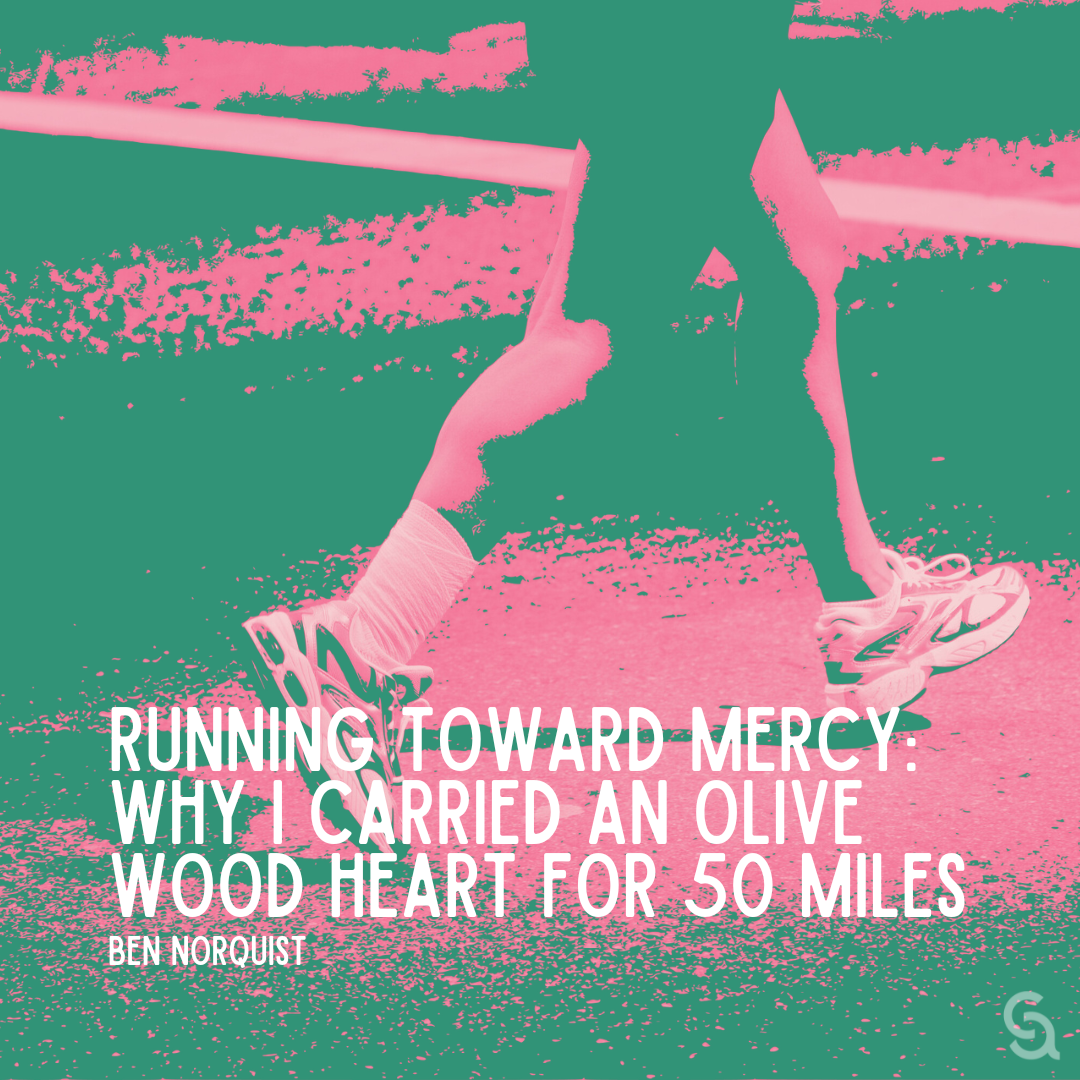 An “Ultra for Peace”
An “Ultra for Peace”
I ran 50 miles in a day.
It was the longest run of my life—physically, emotionally, spiritually. But it wasn’t just a race. It was an indignant plea for justice. I called it my Ultra for Peace, and I ran it in solidarity with the people of Gaza, where more than two million people have been displaced, starved, and bombed with almost no escape. This run was my way of drawing near, my way of keeping Gaza in front of me, of striving to bear witness and respond faithfully.
I carried a small olive wood heart in my hand the entire way.
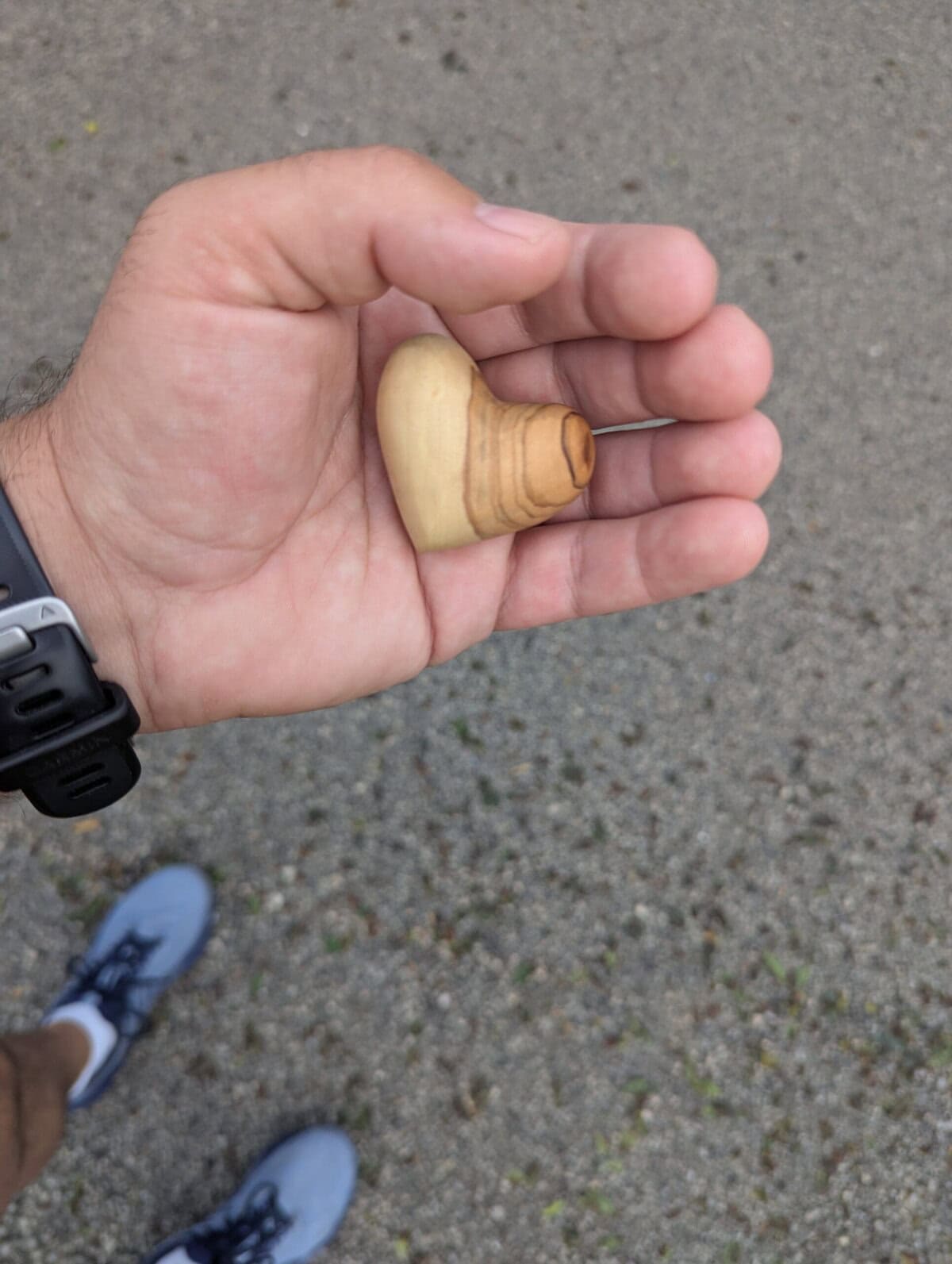
When the death toll of Palestinian children reached 10,000, someone commissioned artisans from Bethlehem to carve 10,000 tiny hearts from olive wood, one for each child killed. I have one of those hearts. On race day, I gripped it every step of the way. Smooth and warm in my hand, carved from the trees of the land itself, it reminded me why I was running.
The weight of a heart
I originally intended to run this race back in January. But after returning from a trip to Palestine last fall, I developed a serious blood clot and the doctor discovered a crushed disc in my neck. I was sidelined. Physical therapy replaced long runs. Plans were paused.
But Gaza couldn’t pause. The siege grew harsher. Israeli airstrikes intensified. Food was blocked. Aid was decimated. People were forced to flee not once, but 10, 15, even 20 times. And the children—so many children—kept dying.
In the Gospels, Jesus doesn’t turn away from suffering. He moves toward it. He places himself among the hungry, the grieving, the displaced. And so, when I was cleared to resume training in February, I began running again—with the people of Gaza in my heart and the hope of following Jesus in my bones.
I’d run marathons before, but 26.2 miles had been the furthest I’d ever run. Training for a 50-miler meant increasingly longer runs every few weeks: 25 miles, 30 miles, then 35. But each mile called for something more than endurance. The miles became intercession, a way to draw nearer to those who cannot choose when or where to run. I ran because I could to continually remind myself and my community about those who run because they must.
Bearing witness with every mile
The Ultra for Peace was also a fundraiser. It was for the Network of Evangelicals for the Middle East (NEME), a growing collective of pastors, scholars, students, and everyday Christians who believe the Gospel calls us to justice and peace—not as fringe add-ons, but as central to the message of Jesus.
NEME works to educate American evangelicals about the lived realities in the Holy Land, to challenge false narratives, and to amplify the voices of Middle Eastern peacemakers. NEME hosts webinars, offers a curriculum for small groups and homeschoolers, convenes sacred gatherings, and fosters transformative encounters between American Christians and Middle Eastern communities.
I set a goal of raising $15,000 for NEME’s work. I invited friends, family, and fellow peacemakers to support the cause—and to join the journey.
To every donor, I offered something personal in return: I asked them to send me a song for my training and race-day playlist, along with a prayer request. The song could be anything—the resulting playlist is a gloriously eclectic collection of genres including Nordic new age, mainstream rock, old-school Christian vocals, modern hymns, hippy folk, and experimental jazz.
Every song was a surprise. And the prayer could be for anything that was on their hearts—a sick family member, a struggling child, or the people of Gaza.
During training and on race day, I ran with their songs in my ears. And when each song came on, I prayed. That rhythm of music and prayer turned my strides into liturgy, and the trail into a cathedral. I prayed for the ill, the grieving, the hopeful, the despairing. I prayed for strangers and friends alike.
What touched me most was the depth and honesty of these tender prayer requests. Some were for children trying to find their way, or in memory of loved ones lost, or for healing—personal, political, communal. One family member simply asked me to pray for kindness to rise in an era that feels relentlessly cruel. It was a joyful honor to carry those prayers.
And then there were the rabbits.
It was late spring in northern Illinois, and the trails were full of baby rabbits. I must’ve seen a hundred that day—skittish and darting, zig-zagging across the path ahead. Somewhere along the way, they began to feel like sacred messengers. As if each one had come to bear witness to a prayer and to carry it off into the world. It was a comforting thought.
I held the olive wood heart in my hand the whole way. I never set it down. As the miles added up, it became heavier physically, but also spiritually, like its grain was absorbing a heavy sorrow. It reminded me of Eve and Raslan, two of the now 17,000 Palestinian children who have been killed. That heart was for them.
A living liturgy of peace
In any official race, runners wear bibs filled with your entry number, sponsorship logos, and other information. My run wasn’t official—it was just a carefully planned solo loop near my home—but I wanted it to feel meaningful. So I designed my own Ultra for Peace bib.
 My brother, Gunnar, is a professional artist. He creates massive graphite drawings—six, seven, even eight feet wide sometimes. Of all of his recent work, I most love his drawing of an ancient olive tree. I asked if I could use it on the bib for the Ultra for Peace. He said yes.
My brother, Gunnar, is a professional artist. He creates massive graphite drawings—six, seven, even eight feet wide sometimes. Of all of his recent work, I most love his drawing of an ancient olive tree. I asked if I could use it on the bib for the Ultra for Peace. He said yes.
There’s no more fitting image for this run. In the Holy Land, olive trees symbolize resilience. They endure. They survive fires, drought, and even uprooting. To my Palestinian friends, olive trees carry spiritual and familial meaning—often planted by grandparents, nourished across generations, and targeted for vandalism by violent settlers. And, of course, the olive branch is a symbol of peace. I wore that tree near my heart on race day.
I printed the bibs on Tyvek, just like a real race bib, and sent them to donors who wanted to walk or run in solidarity. Some of them wore it while moving their bodies for peace. Others tucked it into their Bible or put it on their fridge as a daily reminder for prayer and action. All of it mattered.
I began running before dawn on race day. My wife and kids served as my support crew, leapfrogging in our minivan to meet me with water, electrolytes, and snacks. Friends joined to run segments.
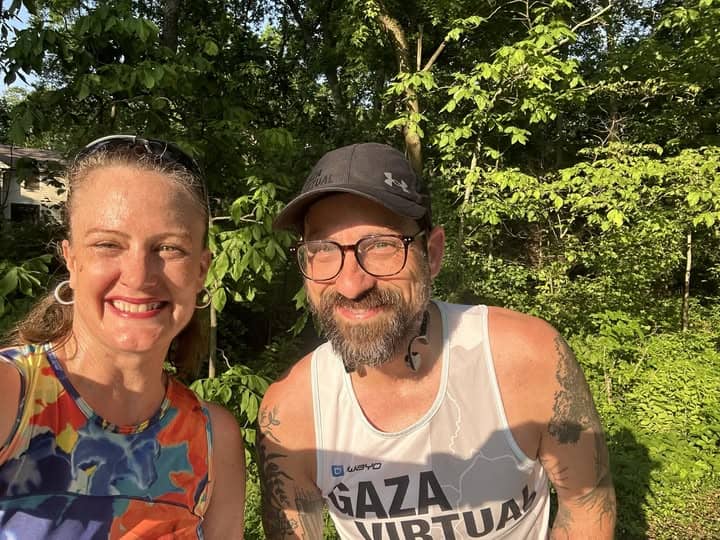 One of those friends was Rev. Dr. Mae Elise Cannon, Executive Director of Churches for Middle East Peace. Mae ran with me for two hours that morning—and not just because she’s a good friend and a strong runner (although she’s both). She’s currently training for her own endurance challenge: a full Ironman triathlon as part of her “Iron(Wo)Man” campaign. Her goal is to complete 140.6 miles and raise funds in support CMEP’s work for justice, peace, and freedom in the Middle East.
One of those friends was Rev. Dr. Mae Elise Cannon, Executive Director of Churches for Middle East Peace. Mae ran with me for two hours that morning—and not just because she’s a good friend and a strong runner (although she’s both). She’s currently training for her own endurance challenge: a full Ironman triathlon as part of her “Iron(Wo)Man” campaign. Her goal is to complete 140.6 miles and raise funds in support CMEP’s work for justice, peace, and freedom in the Middle East.
Mae’s journey is personal and spiritual—just like mine. She’s well into her training and participating in several smaller races leading up to the race in fall 2025. Every stroke, pedal, and stride she takes will be a witness to her conviction that a different future is possible—one where Gazan children are safe, where freedom takes root, where peace prevails. I’m unspeakably proud of her and want to encourage everyone who followed my Ultra for Peace to now follow Mae’s journey.
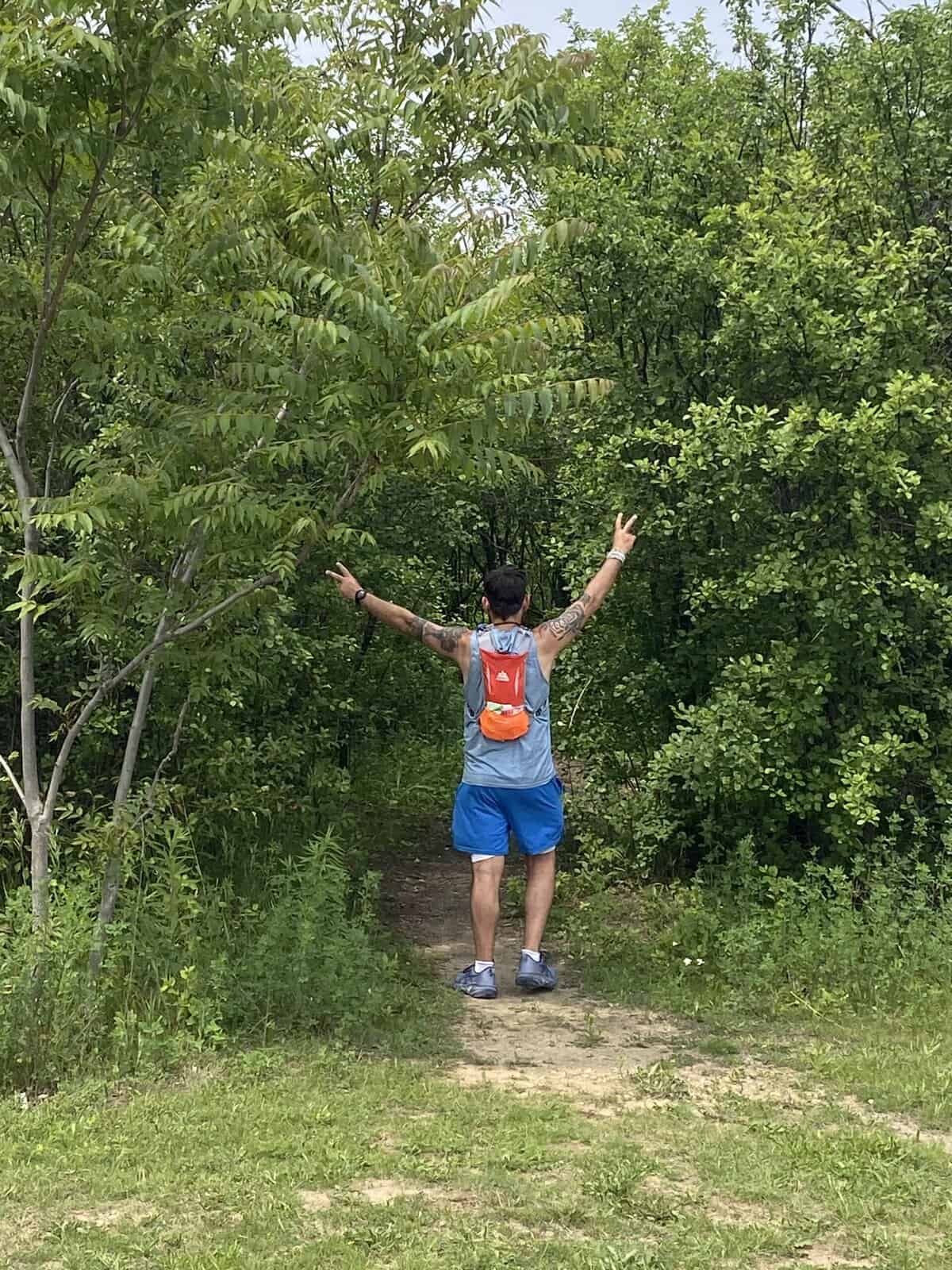 Together, we are part of a larger movement—people moving their bodies as a form of witness, as a cry for mercy, as an act of love.
Together, we are part of a larger movement—people moving their bodies as a form of witness, as a cry for mercy, as an act of love.
At the finish line, I was exhausted—and full. We had surpassed our fundraising goal, raising $15,450. But more than that, people had shown up. They prayed. They gave. They ran. They believed in peace.
The Ultra for Peace was, in every way, an aspiration to gospel witness. Because the gospel isn’t just about personal salvation—it’s about the inbreaking of God’s kingdom.
It’s about liberation for the captive, good news for the poor, and freedom for the oppressed.
The gospel calls us into a life of action.
_____
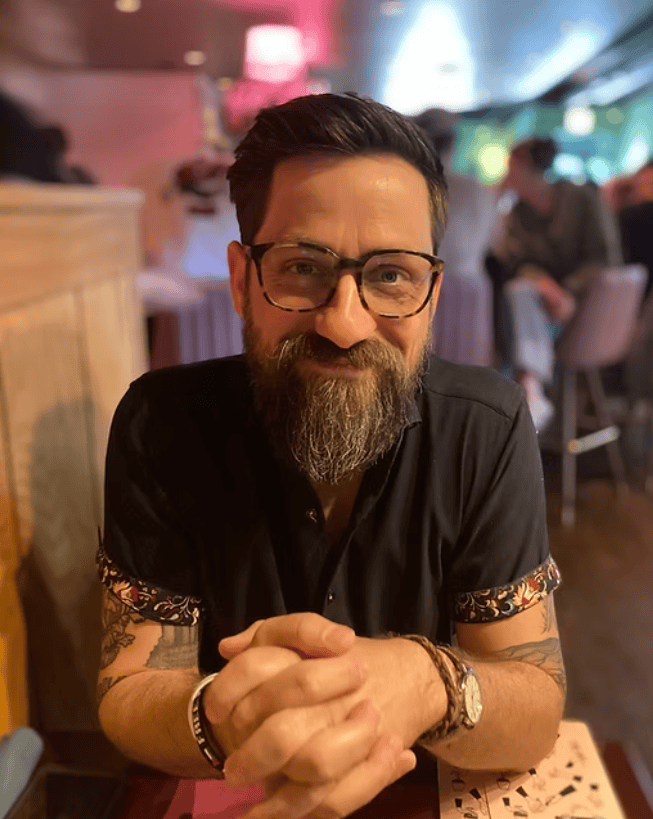 Ben Norquist is a writer, educator, and advocate whose work explores the intersections of faith, justice, and place. He serves as Director of Grants at Churches for Middle East Peace and has worked with the Network of Evangelicals for the Middle East. Ben holds a Ph.D. in higher education from Azusa Pacific University, where his research focused on Palestinian universities navigating life under Israeli military occupation. He is currently completing a book with InterVarsity Press—Every Somewhere Sacred: Rescuing a Theology of Place in the American Imagination—on Christian imagination, land, and belonging. As a long-distance runner, Ben brings his convictions to the road, most recently completing a 50-mile “Ultra for Peace” run to raise funds and awareness for peace in Israel and Palestine. For him, running is both a physical discipline and a form of embodied solidarity with the suffering.
Ben Norquist is a writer, educator, and advocate whose work explores the intersections of faith, justice, and place. He serves as Director of Grants at Churches for Middle East Peace and has worked with the Network of Evangelicals for the Middle East. Ben holds a Ph.D. in higher education from Azusa Pacific University, where his research focused on Palestinian universities navigating life under Israeli military occupation. He is currently completing a book with InterVarsity Press—Every Somewhere Sacred: Rescuing a Theology of Place in the American Imagination—on Christian imagination, land, and belonging. As a long-distance runner, Ben brings his convictions to the road, most recently completing a 50-mile “Ultra for Peace” run to raise funds and awareness for peace in Israel and Palestine. For him, running is both a physical discipline and a form of embodied solidarity with the suffering.


